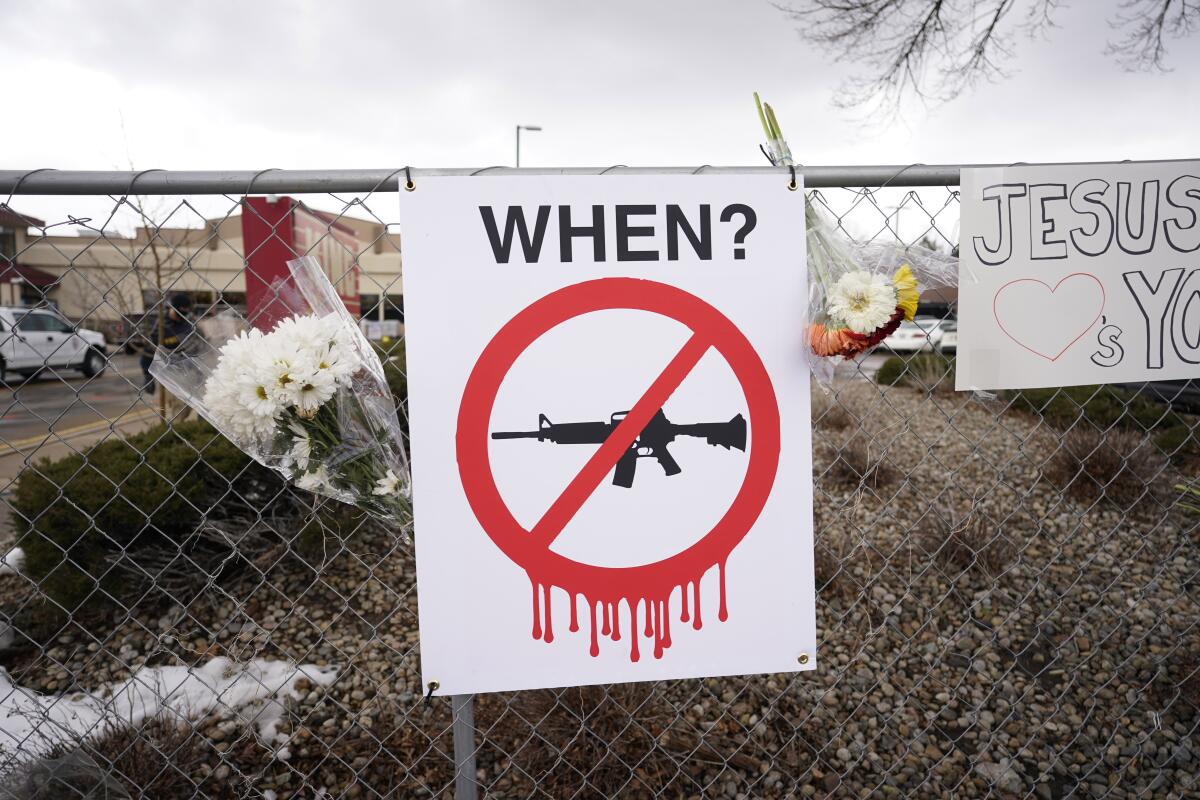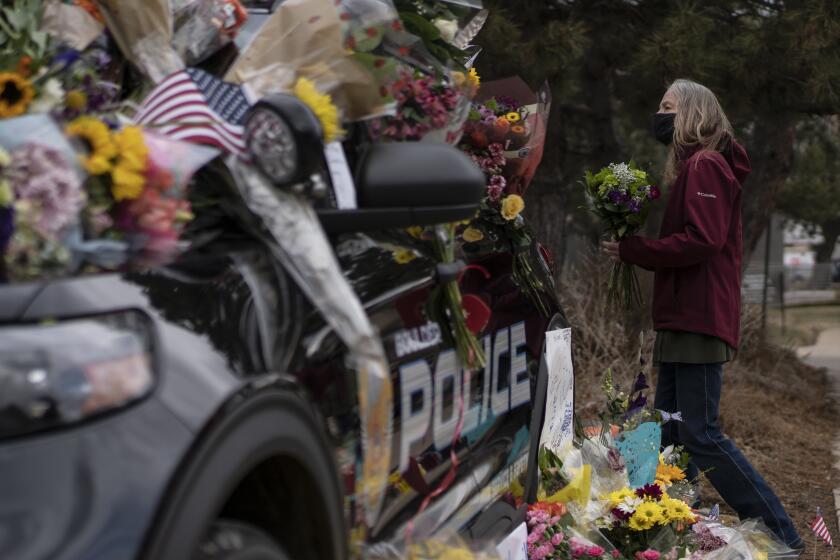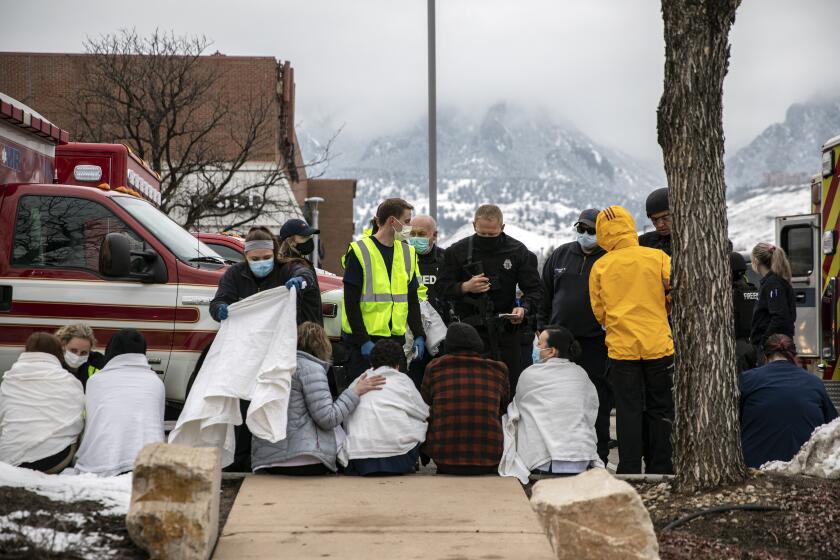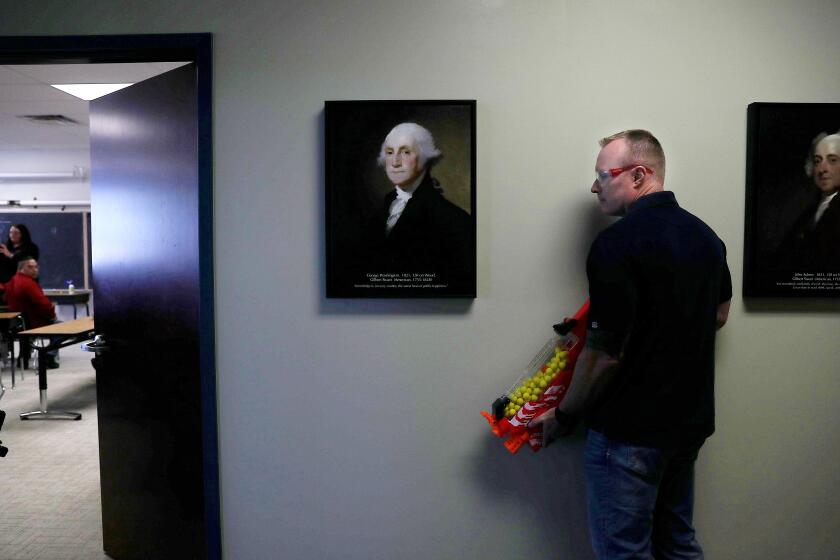After Boulder shooting, gun reform is again gaining steam. Survivors wonder if it will last

- Share via
BOULDER, Colo. — In 2018, the Boulder City Council made national news for unanimously voting to outlaw assault weapons and high-capacity magazines.
With plenty of military-style rifles for sale nearby, the ban — a response to the deaths of 17 people in a mass shooting at Marjory Stoneman Douglas High School in Parkland, Fla. — was unlikely to to stop anybody from buying one.
But its proponents wanted to send a message to lawmakers up the chain.
“My hope is that we will see more bans at the state level, and one day at the federal level, so these weapons will no longer be available,” Boulder Councilman Aaron Brockett said at the time.
Local gun groups, backed by the National Rifle Assn., immediately challenged the ban in court. On March 12, Boulder County District Judge Andrew Hartman threw the ban out, ruling that state law prevented cities from making their own gun rules.
Ten days later — Monday — a gunman turned a Boulder supermarket into a bloodbath, bringing more pain to a region that has a long history of mass shootings, and renewing a national debate over gun control.
“It doesn’t shock me at all, this shooting,” said Tom Mauser, a gun reform activist in the nearby city of Littleton, where his son, Daniel, was among the 13 people — along with two shooters — who died in the 1999 massacre at Columbine High School. “This problem is pervasive. This is America.”
Despite his activism, Hauser echoed the feelings of many here when he wondered aloud about whether legislation could stop the next slaughter.
The 21-year-old charged with 10 counts of murder had a reputation for behavior so erratic that some relatives believed he was mentally ill.
“We need to do more to tighten our gun laws,” he said. “We do. But will those things stop shootings? Maybe. Maybe not.”
Still, as area residents mourned the 10 people who were killed at the King Soopers grocery store, many said they want to use the tragedy to push the nation ahead on gun restrictions.
A local chapter of Moms Demand Action, a national group that was founded after the 2012 Sandy Hook Elementary School shooting in Newtown, Conn., planned to call for gun reform at a drive-in vigil Thursday.
Responding to the Boulder attack, President Biden has urged Congress to ban high-capacity ammunition magazines and assault rifles and close background check loopholes, suggesting he may go at it alone through executive action if Congress does not act.
“I don’t need to wait another minute, let alone an hour, to take commonsense steps that will save lives in the future and to urge my colleagues in the House and Senate to act,” he said this week.
Some locals aren’t optimistic.
“There have been so many chances after national sorrow and renewed resolve around guns,” said Boulder County Commissioner Claire Levy, who sponsored several gun-related laws in her seven years as a state legislator.
“Local laws aren’t effective. State laws have made some progress,” she said. “But it’s simply too easy to get a gun. We need a ban on assault weapons and we need the change to be national.”
“I’m angry that we have to go through this, again and again and again,” she said.
Colorado, a state that draws newcomers for its natural beauty, hunting, snow sports and hiking, is a blue state with a Democratic governor, and a place where residents have long held strong to the 2nd Amendment. After Columbine, the Denver area has experienced several mass shootings, most notably at an Aurora movie theater where a gunman killed 12 people in 2012 during a midnight screening of “The Dark Knight Rises.”
Over 25 years, the Denver suburbs have seen a string of mass shootings — in supermarkets, schools, a movie theater, a Planned Parenthood clinic.
One of those who died was Jessi Phillips. Her mother, Sandy Phillips, has since traveled the country to offer trauma counseling referrals and services to mass-shooting survivors and their families.
“We have such easy access to guns. We have to make it more difficult and make sure people are responsible gun owners,” said Phillips, who runs a group called Survivors Empowered. “We have to push Biden to do what he has promised.”
Jace Seeger, who was sitting in the second row of the Aurora theater when that massacre began, sees things differently.
“This shooting was like our own — people doing everyday things, seeing shots, not knowing where the exits are, feeling trapped,” said Seeger, 30, who lives in Aurora and works in insurance sales.
“I’m all for people trying to change how we get guns if they believe that is right,” he said. “I don’t know what the solution is. Is it better gun laws? Or having more mental health services? Who am I to say.
“For me, it’s not guns who kill people; it’s people who make choices to kill people,” he added. “And we have to get those people to stop making those choices.”
For Jane Dougherty, a Littleton resident and gun reform advocate with Moms Demand Action, changing how guns are purchased and who can get them — such as the current push by Democrats in the state Legislature for a five-day waiting period for purchases — are “common sense.”
Dougherty’s sister, Mary Sherlach, was a school psychologist who died in the Sandy Hook shooting.
Dougherty worried this moment for change would be fleeting.
“We’ve seen how after mass shootings, this subject comes back up, bills are introduced and then nothing happens,” she said. “People forget.”
For now, Boulder mourns. On Wednesday, a procession for Eric Talley, the 51-year-old police officer killed in the rampage, was followed by a candlelight vigil and Jewish and Unitarian Universalist services for all of the victims.
Active shooter response training teaches various options for dealing with a potential mass shooting, from hiding to taking down the gunman.
Authorities have shed little light on what might have motivated Ahmad Al Aliwi Alissa, who was scheduled to be arraigned Thursday on 10 counts of murder.
An arrest affidavit says Alissa bought a Ruger AR-556 — a high-powered rifle similar to an AR-15 — six days before the shooting, but does not say where he purchased it. It also says he was armed with a semiautomatic handgun.
Alissa, who lived in nearby Arvada, pleaded guilty to a misdemeanor for assault of a high school classmate in 2018, though that record would typically not prevent a person from buying a gun.
Paul Paradis, the owner of a gun shop in downtown Boulder — Paradise Sales — said he mourned for the victims but didn’t believe banning assault weapons would prevent mass violence.
Like many gun rights advocates, he celebrated when the judge overturned Boulder’s ban. He said the mass shooting this week didn’t change his feelings about weapons like the AR-15.
“People use them for hunting and self-defense,” he said. “Many people use these, have no intention of hurting anyone and have nothing to do with killings.”
Though the judge struck down the Boulder law in its entirety, Colorado continues to outlaw sales of magazines that hold more than 15 rounds under a 2013 law that was upheld last year by the state Supreme Court.
Boulder officials said this week that they had not decided whether to appeal to the court to reinstate the prohibition on assault weapons.
Kaleem reported from Boulder and Etehad from Los Angeles.
More to Read
Sign up for Essential California
The most important California stories and recommendations in your inbox every morning.
You may occasionally receive promotional content from the Los Angeles Times.















